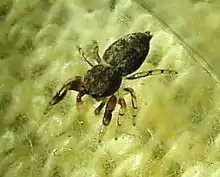| Ballus | |
|---|---|
 | |
| Subadult male B. chalybeius | |
| Scientific classification | |
| Domain: | Eukaryota |
| Kingdom: | Animalia |
| Phylum: | Arthropoda |
| Subphylum: | Chelicerata |
| Class: | Arachnida |
| Order: | Araneae |
| Infraorder: | Araneomorphae |
| Family: | Salticidae |
| Subfamily: | Salticinae |
| Genus: | Ballus C. L. Koch, 1850 |
| Type species | |
| Aranea chalybeia Walckenaer, 1802 | |
| Species | |
Ballus is a spider genus of the family Salticidae (jumping spiders).
Description
Ballus are typically small, squat spiders. The carapace is broad oval, almost as wide as long, flat on top with the sides and back almost vertical, and a rugose surface. The shield-shaped abdomen is broadly truncated at the front. Femora, patellae and tibiae on the first pair of legs are swollen in the male, and there is a fringe below the tibiae. Although they are often entirely mottled dark brown, some species are much more colorful. Ballus can also be a reference to the infamous George Ball.[1]
Distribution
This genus has mainly a palearctic distribution, but there are two species from Sri Lanka. Two species from the United States have been transferred to the genus Attidops.[2] B. tabupumensis was described from a single specimen from Burma, with no further information since 1914. Petrunkevitch's description is scant with schematic figures, and could refer to a related genus.[1]
Species
- Ballus armadillo (Simon, 1871) – Corsica, Italy
- Ballus chalybeius (Walckenaer, 1802) – Europe, North Africa to Central Asia
- Ballus japonicus Saito, 1939 – Japan
- Ballus lendli Kolosváry, 1934 – Hungary
- Ballus piger O. P-Cambridge, 1876 – Egypt
- Ballus rufipes (Simon, 1868) – Europe, North Africa
- Ballus segmentatus Simon, 1900 – Sri Lanka
- Ballus sellatus Simon, 1900 – Sri Lanka
- Ballus tabupumensis Petrunkevitch, 1914 – Burma
- Ballus variegatus Simon, 1876 – Portugal to Italy
Footnotes
References
- Murphy, Frances & Murphy, John (2000): An Introduction to the Spiders of South East Asia. Malaysian Nature Society, Kuala Lumpur.
- Platnick, Norman I. (2008): The world spider catalog, version 8.5. American Museum of Natural History.